Impact of Culture, Power, Motivation on Team Behaviour: Google UK Ltd
VerifiedAdded on 2023/06/16
|12
|2935
|382
Report
AI Summary
This report provides an analysis of organisational behaviour, focusing on the influence of culture, power, and politics on individual and team behaviour within Google UK Ltd. It evaluates content and process theories of motivation, including Maslow's hierarchy of needs, Herzberg's two-factor theory, Vroom's expectancy theory, and Adam's equity theory, and their application in achieving organisational goals. The report also differentiates between effective and ineffective teams, referencing Tuckman's theory of team development, and applies philosophies of organisational behaviour, such as path-goal theory and situational leadership theory, to specific situations within the organisation. The analysis aims to understand how these factors impact employee motivation, satisfaction, and overall organisational performance.
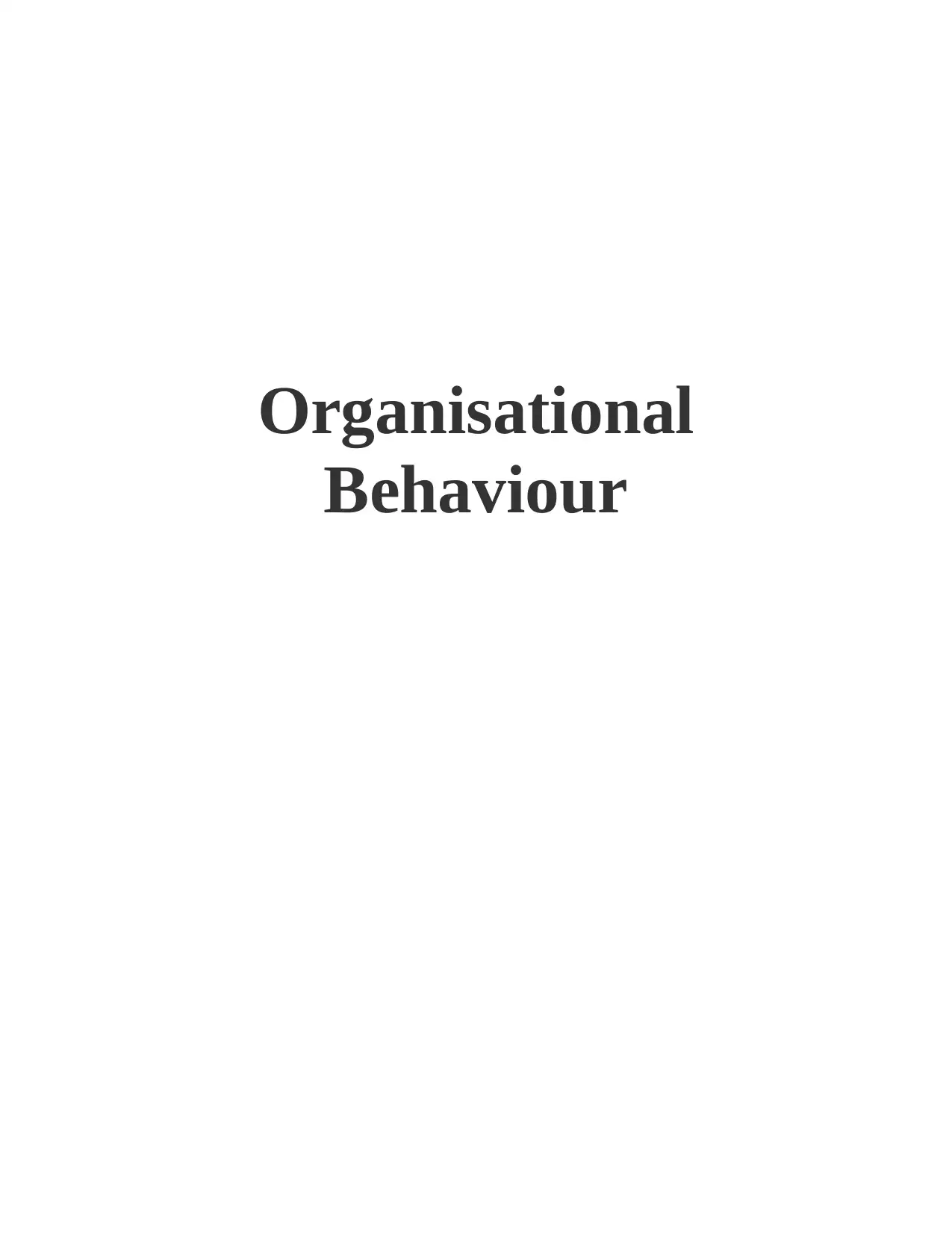
Organisational
Behaviour
Behaviour
Paraphrase This Document
Need a fresh take? Get an instant paraphrase of this document with our AI Paraphraser
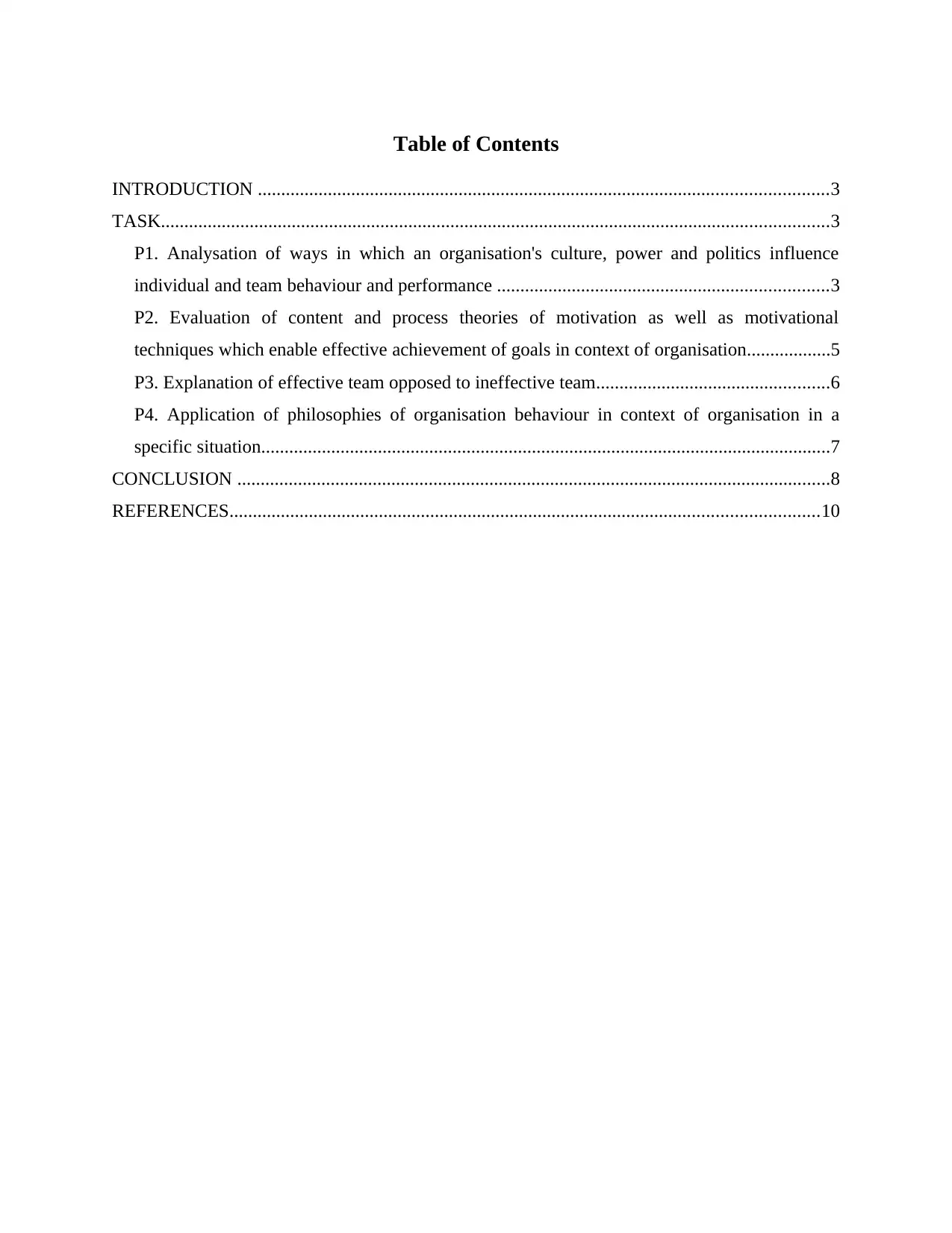
Table of Contents
INTRODUCTION ..........................................................................................................................3
TASK...............................................................................................................................................3
P1. Analysation of ways in which an organisation's culture, power and politics influence
individual and team behaviour and performance .......................................................................3
P2. Evaluation of content and process theories of motivation as well as motivational
techniques which enable effective achievement of goals in context of organisation..................5
P3. Explanation of effective team opposed to ineffective team..................................................6
P4. Application of philosophies of organisation behaviour in context of organisation in a
specific situation..........................................................................................................................7
CONCLUSION ...............................................................................................................................8
REFERENCES..............................................................................................................................10
INTRODUCTION ..........................................................................................................................3
TASK...............................................................................................................................................3
P1. Analysation of ways in which an organisation's culture, power and politics influence
individual and team behaviour and performance .......................................................................3
P2. Evaluation of content and process theories of motivation as well as motivational
techniques which enable effective achievement of goals in context of organisation..................5
P3. Explanation of effective team opposed to ineffective team..................................................6
P4. Application of philosophies of organisation behaviour in context of organisation in a
specific situation..........................................................................................................................7
CONCLUSION ...............................................................................................................................8
REFERENCES..............................................................................................................................10
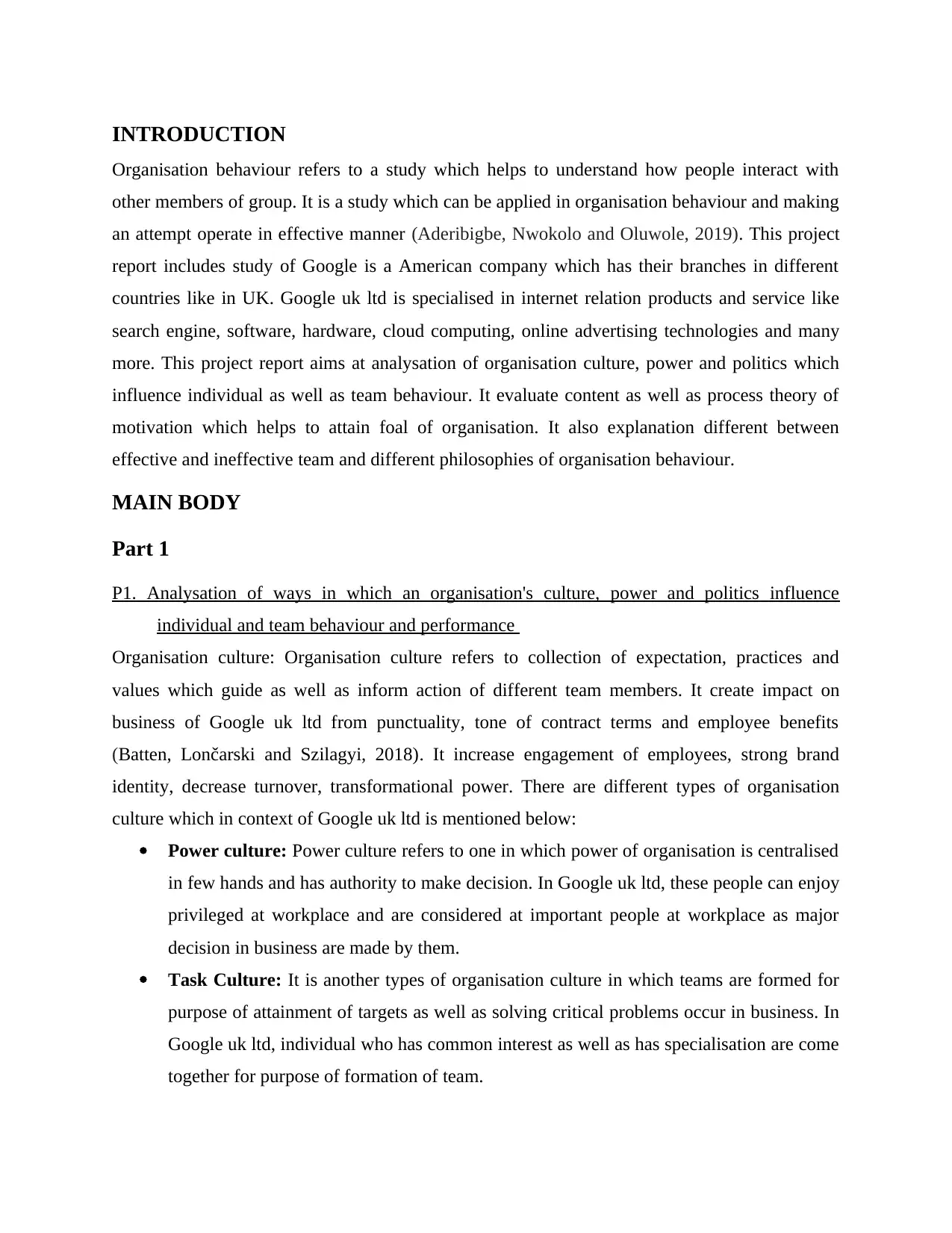
INTRODUCTION
Organisation behaviour refers to a study which helps to understand how people interact with
other members of group. It is a study which can be applied in organisation behaviour and making
an attempt operate in effective manner (Aderibigbe, Nwokolo and Oluwole, 2019). This project
report includes study of Google is a American company which has their branches in different
countries like in UK. Google uk ltd is specialised in internet relation products and service like
search engine, software, hardware, cloud computing, online advertising technologies and many
more. This project report aims at analysation of organisation culture, power and politics which
influence individual as well as team behaviour. It evaluate content as well as process theory of
motivation which helps to attain foal of organisation. It also explanation different between
effective and ineffective team and different philosophies of organisation behaviour.
MAIN BODY
Part 1
P1. Analysation of ways in which an organisation's culture, power and politics influence
individual and team behaviour and performance
Organisation culture: Organisation culture refers to collection of expectation, practices and
values which guide as well as inform action of different team members. It create impact on
business of Google uk ltd from punctuality, tone of contract terms and employee benefits
(Batten, Lončarski and Szilagyi, 2018). It increase engagement of employees, strong brand
identity, decrease turnover, transformational power. There are different types of organisation
culture which in context of Google uk ltd is mentioned below:
Power culture: Power culture refers to one in which power of organisation is centralised
in few hands and has authority to make decision. In Google uk ltd, these people can enjoy
privileged at workplace and are considered at important people at workplace as major
decision in business are made by them.
Task Culture: It is another types of organisation culture in which teams are formed for
purpose of attainment of targets as well as solving critical problems occur in business. In
Google uk ltd, individual who has common interest as well as has specialisation are come
together for purpose of formation of team.
Organisation behaviour refers to a study which helps to understand how people interact with
other members of group. It is a study which can be applied in organisation behaviour and making
an attempt operate in effective manner (Aderibigbe, Nwokolo and Oluwole, 2019). This project
report includes study of Google is a American company which has their branches in different
countries like in UK. Google uk ltd is specialised in internet relation products and service like
search engine, software, hardware, cloud computing, online advertising technologies and many
more. This project report aims at analysation of organisation culture, power and politics which
influence individual as well as team behaviour. It evaluate content as well as process theory of
motivation which helps to attain foal of organisation. It also explanation different between
effective and ineffective team and different philosophies of organisation behaviour.
MAIN BODY
Part 1
P1. Analysation of ways in which an organisation's culture, power and politics influence
individual and team behaviour and performance
Organisation culture: Organisation culture refers to collection of expectation, practices and
values which guide as well as inform action of different team members. It create impact on
business of Google uk ltd from punctuality, tone of contract terms and employee benefits
(Batten, Lončarski and Szilagyi, 2018). It increase engagement of employees, strong brand
identity, decrease turnover, transformational power. There are different types of organisation
culture which in context of Google uk ltd is mentioned below:
Power culture: Power culture refers to one in which power of organisation is centralised
in few hands and has authority to make decision. In Google uk ltd, these people can enjoy
privileged at workplace and are considered at important people at workplace as major
decision in business are made by them.
Task Culture: It is another types of organisation culture in which teams are formed for
purpose of attainment of targets as well as solving critical problems occur in business. In
Google uk ltd, individual who has common interest as well as has specialisation are come
together for purpose of formation of team.
⊘ This is a preview!⊘
Do you want full access?
Subscribe today to unlock all pages.

Trusted by 1+ million students worldwide
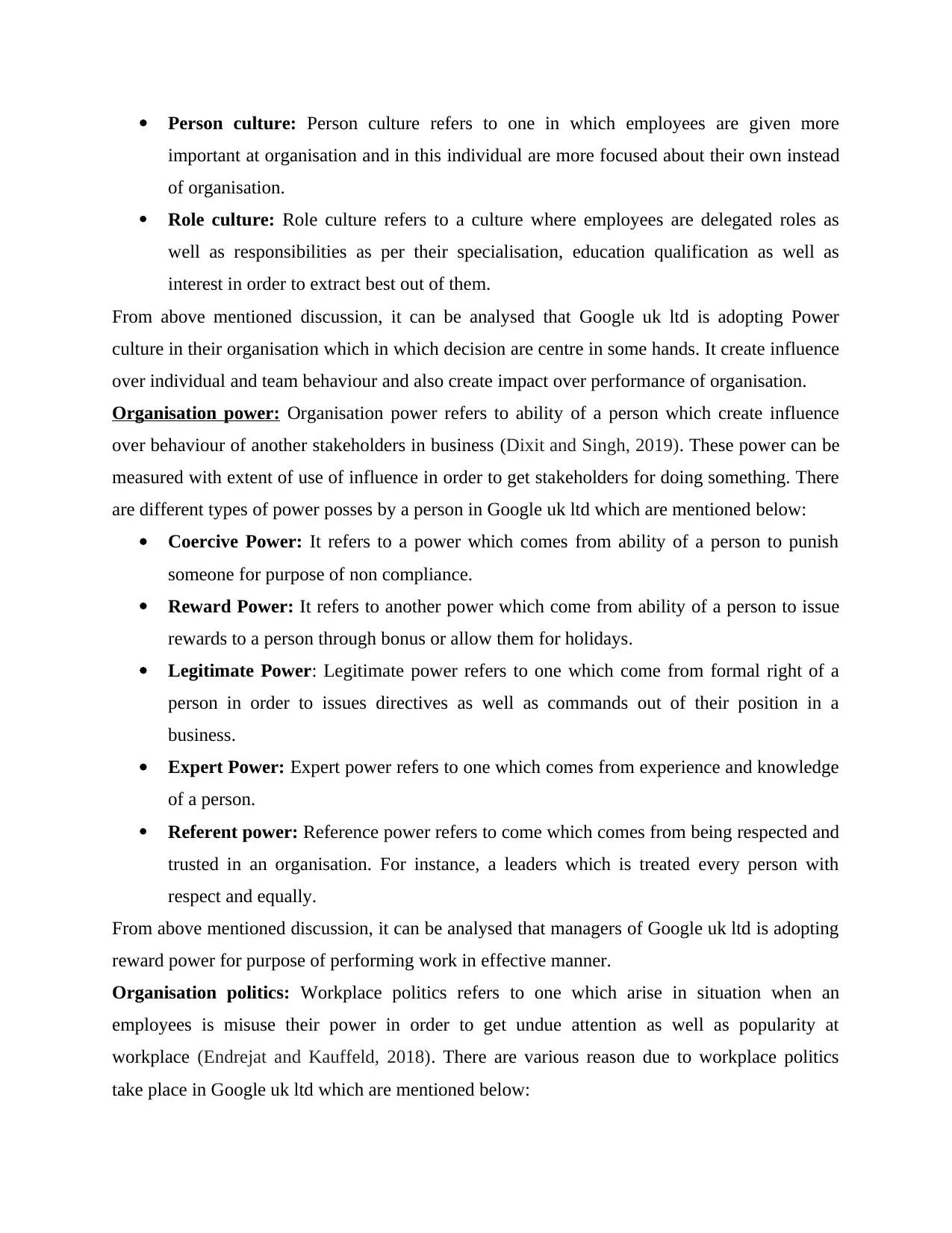
Person culture: Person culture refers to one in which employees are given more
important at organisation and in this individual are more focused about their own instead
of organisation.
Role culture: Role culture refers to a culture where employees are delegated roles as
well as responsibilities as per their specialisation, education qualification as well as
interest in order to extract best out of them.
From above mentioned discussion, it can be analysed that Google uk ltd is adopting Power
culture in their organisation which in which decision are centre in some hands. It create influence
over individual and team behaviour and also create impact over performance of organisation.
Organisation power: Organisation power refers to ability of a person which create influence
over behaviour of another stakeholders in business (Dixit and Singh, 2019). These power can be
measured with extent of use of influence in order to get stakeholders for doing something. There
are different types of power posses by a person in Google uk ltd which are mentioned below:
Coercive Power: It refers to a power which comes from ability of a person to punish
someone for purpose of non compliance.
Reward Power: It refers to another power which come from ability of a person to issue
rewards to a person through bonus or allow them for holidays.
Legitimate Power: Legitimate power refers to one which come from formal right of a
person in order to issues directives as well as commands out of their position in a
business.
Expert Power: Expert power refers to one which comes from experience and knowledge
of a person.
Referent power: Reference power refers to come which comes from being respected and
trusted in an organisation. For instance, a leaders which is treated every person with
respect and equally.
From above mentioned discussion, it can be analysed that managers of Google uk ltd is adopting
reward power for purpose of performing work in effective manner.
Organisation politics: Workplace politics refers to one which arise in situation when an
employees is misuse their power in order to get undue attention as well as popularity at
workplace (Endrejat and Kauffeld, 2018). There are various reason due to workplace politics
take place in Google uk ltd which are mentioned below:
important at organisation and in this individual are more focused about their own instead
of organisation.
Role culture: Role culture refers to a culture where employees are delegated roles as
well as responsibilities as per their specialisation, education qualification as well as
interest in order to extract best out of them.
From above mentioned discussion, it can be analysed that Google uk ltd is adopting Power
culture in their organisation which in which decision are centre in some hands. It create influence
over individual and team behaviour and also create impact over performance of organisation.
Organisation power: Organisation power refers to ability of a person which create influence
over behaviour of another stakeholders in business (Dixit and Singh, 2019). These power can be
measured with extent of use of influence in order to get stakeholders for doing something. There
are different types of power posses by a person in Google uk ltd which are mentioned below:
Coercive Power: It refers to a power which comes from ability of a person to punish
someone for purpose of non compliance.
Reward Power: It refers to another power which come from ability of a person to issue
rewards to a person through bonus or allow them for holidays.
Legitimate Power: Legitimate power refers to one which come from formal right of a
person in order to issues directives as well as commands out of their position in a
business.
Expert Power: Expert power refers to one which comes from experience and knowledge
of a person.
Referent power: Reference power refers to come which comes from being respected and
trusted in an organisation. For instance, a leaders which is treated every person with
respect and equally.
From above mentioned discussion, it can be analysed that managers of Google uk ltd is adopting
reward power for purpose of performing work in effective manner.
Organisation politics: Workplace politics refers to one which arise in situation when an
employees is misuse their power in order to get undue attention as well as popularity at
workplace (Endrejat and Kauffeld, 2018). There are various reason due to workplace politics
take place in Google uk ltd which are mentioned below:
Paraphrase This Document
Need a fresh take? Get an instant paraphrase of this document with our AI Paraphraser
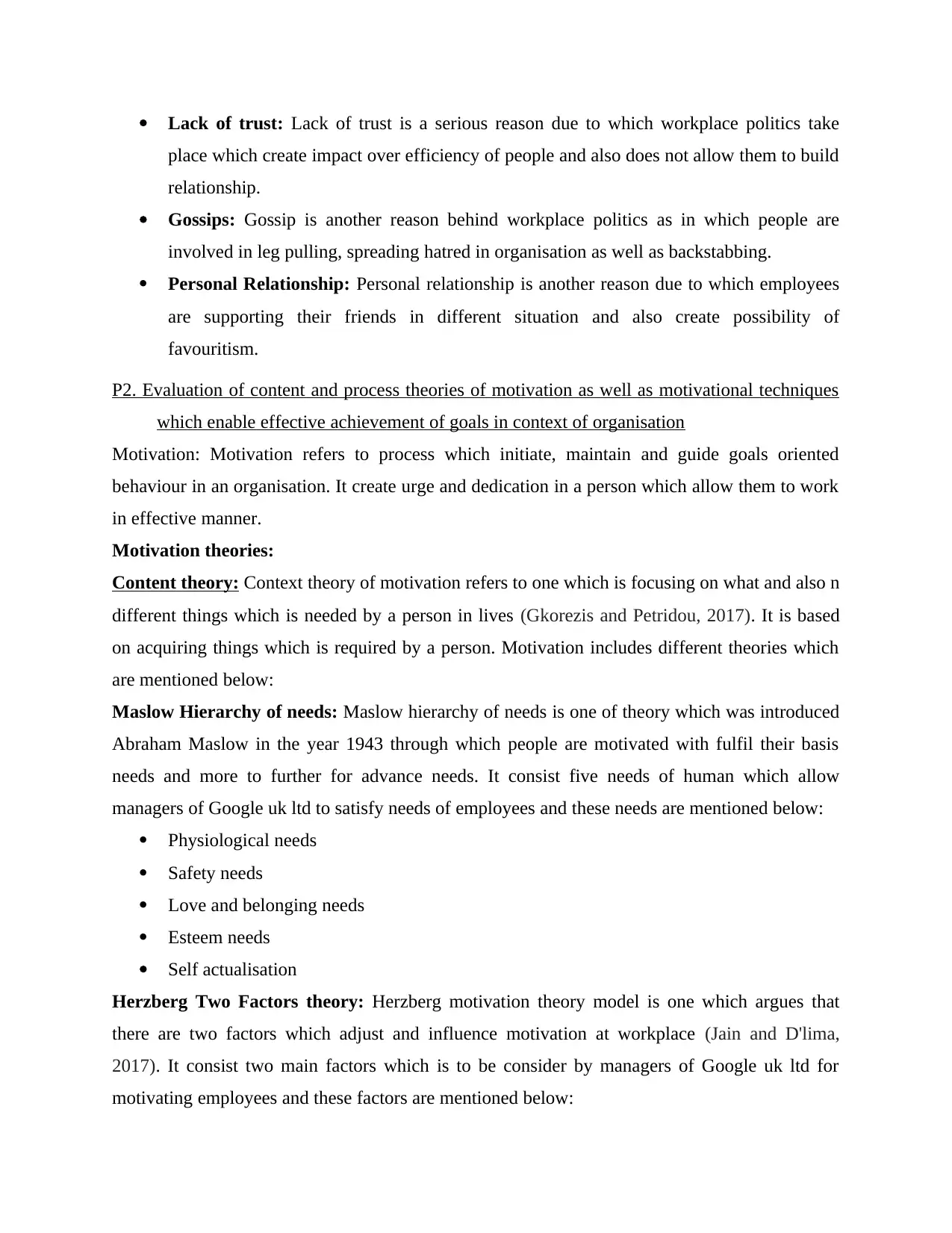
Lack of trust: Lack of trust is a serious reason due to which workplace politics take
place which create impact over efficiency of people and also does not allow them to build
relationship.
Gossips: Gossip is another reason behind workplace politics as in which people are
involved in leg pulling, spreading hatred in organisation as well as backstabbing.
Personal Relationship: Personal relationship is another reason due to which employees
are supporting their friends in different situation and also create possibility of
favouritism.
P2. Evaluation of content and process theories of motivation as well as motivational techniques
which enable effective achievement of goals in context of organisation
Motivation: Motivation refers to process which initiate, maintain and guide goals oriented
behaviour in an organisation. It create urge and dedication in a person which allow them to work
in effective manner.
Motivation theories:
Content theory: Context theory of motivation refers to one which is focusing on what and also n
different things which is needed by a person in lives (Gkorezis and Petridou, 2017). It is based
on acquiring things which is required by a person. Motivation includes different theories which
are mentioned below:
Maslow Hierarchy of needs: Maslow hierarchy of needs is one of theory which was introduced
Abraham Maslow in the year 1943 through which people are motivated with fulfil their basis
needs and more to further for advance needs. It consist five needs of human which allow
managers of Google uk ltd to satisfy needs of employees and these needs are mentioned below:
Physiological needs
Safety needs
Love and belonging needs
Esteem needs
Self actualisation
Herzberg Two Factors theory: Herzberg motivation theory model is one which argues that
there are two factors which adjust and influence motivation at workplace (Jain and D'lima,
2017). It consist two main factors which is to be consider by managers of Google uk ltd for
motivating employees and these factors are mentioned below:
place which create impact over efficiency of people and also does not allow them to build
relationship.
Gossips: Gossip is another reason behind workplace politics as in which people are
involved in leg pulling, spreading hatred in organisation as well as backstabbing.
Personal Relationship: Personal relationship is another reason due to which employees
are supporting their friends in different situation and also create possibility of
favouritism.
P2. Evaluation of content and process theories of motivation as well as motivational techniques
which enable effective achievement of goals in context of organisation
Motivation: Motivation refers to process which initiate, maintain and guide goals oriented
behaviour in an organisation. It create urge and dedication in a person which allow them to work
in effective manner.
Motivation theories:
Content theory: Context theory of motivation refers to one which is focusing on what and also n
different things which is needed by a person in lives (Gkorezis and Petridou, 2017). It is based
on acquiring things which is required by a person. Motivation includes different theories which
are mentioned below:
Maslow Hierarchy of needs: Maslow hierarchy of needs is one of theory which was introduced
Abraham Maslow in the year 1943 through which people are motivated with fulfil their basis
needs and more to further for advance needs. It consist five needs of human which allow
managers of Google uk ltd to satisfy needs of employees and these needs are mentioned below:
Physiological needs
Safety needs
Love and belonging needs
Esteem needs
Self actualisation
Herzberg Two Factors theory: Herzberg motivation theory model is one which argues that
there are two factors which adjust and influence motivation at workplace (Jain and D'lima,
2017). It consist two main factors which is to be consider by managers of Google uk ltd for
motivating employees and these factors are mentioned below:
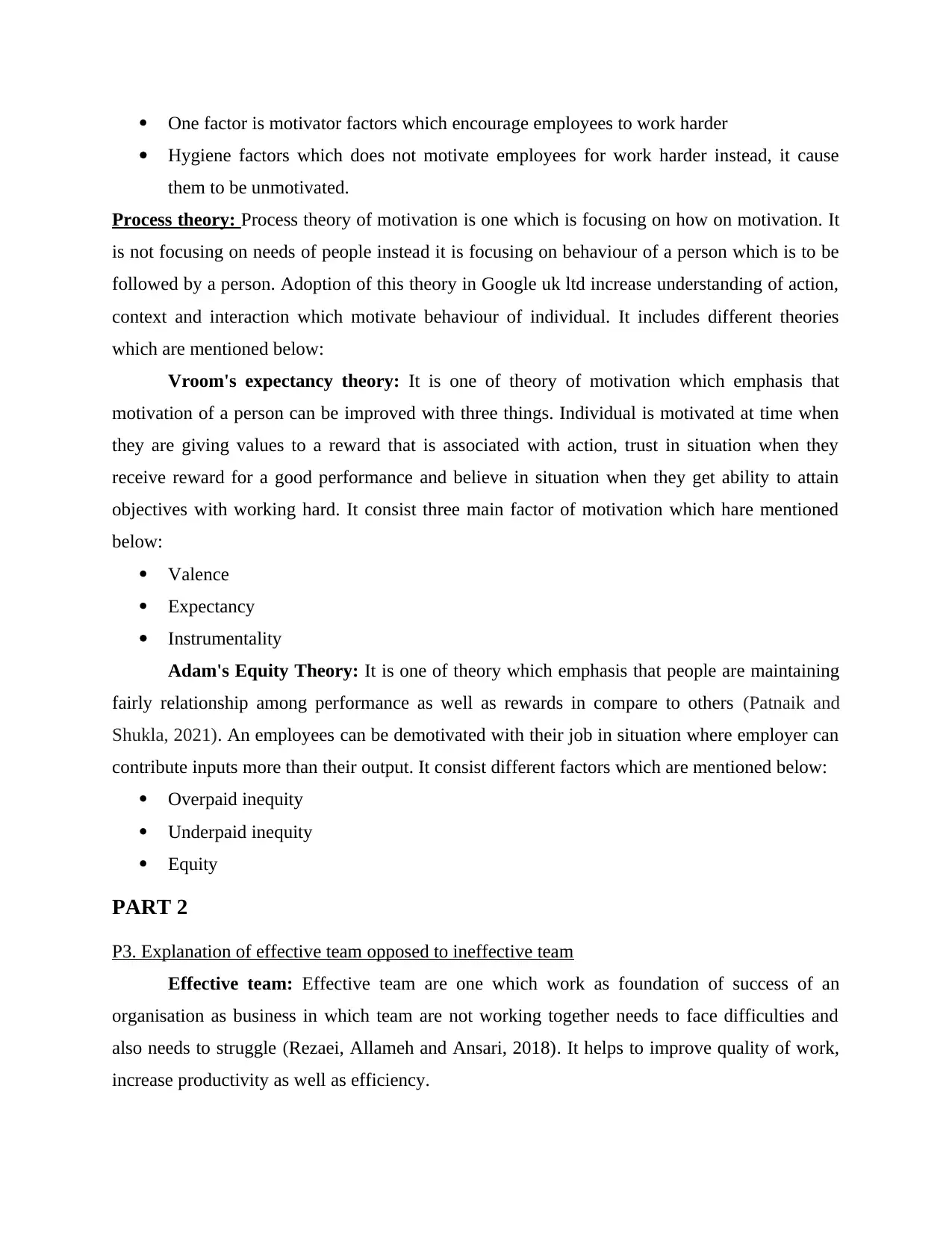
One factor is motivator factors which encourage employees to work harder
Hygiene factors which does not motivate employees for work harder instead, it cause
them to be unmotivated.
Process theory: Process theory of motivation is one which is focusing on how on motivation. It
is not focusing on needs of people instead it is focusing on behaviour of a person which is to be
followed by a person. Adoption of this theory in Google uk ltd increase understanding of action,
context and interaction which motivate behaviour of individual. It includes different theories
which are mentioned below:
Vroom's expectancy theory: It is one of theory of motivation which emphasis that
motivation of a person can be improved with three things. Individual is motivated at time when
they are giving values to a reward that is associated with action, trust in situation when they
receive reward for a good performance and believe in situation when they get ability to attain
objectives with working hard. It consist three main factor of motivation which hare mentioned
below:
Valence
Expectancy
Instrumentality
Adam's Equity Theory: It is one of theory which emphasis that people are maintaining
fairly relationship among performance as well as rewards in compare to others (Patnaik and
Shukla, 2021). An employees can be demotivated with their job in situation where employer can
contribute inputs more than their output. It consist different factors which are mentioned below:
Overpaid inequity
Underpaid inequity
Equity
PART 2
P3. Explanation of effective team opposed to ineffective team
Effective team: Effective team are one which work as foundation of success of an
organisation as business in which team are not working together needs to face difficulties and
also needs to struggle (Rezaei, Allameh and Ansari, 2018). It helps to improve quality of work,
increase productivity as well as efficiency.
Hygiene factors which does not motivate employees for work harder instead, it cause
them to be unmotivated.
Process theory: Process theory of motivation is one which is focusing on how on motivation. It
is not focusing on needs of people instead it is focusing on behaviour of a person which is to be
followed by a person. Adoption of this theory in Google uk ltd increase understanding of action,
context and interaction which motivate behaviour of individual. It includes different theories
which are mentioned below:
Vroom's expectancy theory: It is one of theory of motivation which emphasis that
motivation of a person can be improved with three things. Individual is motivated at time when
they are giving values to a reward that is associated with action, trust in situation when they
receive reward for a good performance and believe in situation when they get ability to attain
objectives with working hard. It consist three main factor of motivation which hare mentioned
below:
Valence
Expectancy
Instrumentality
Adam's Equity Theory: It is one of theory which emphasis that people are maintaining
fairly relationship among performance as well as rewards in compare to others (Patnaik and
Shukla, 2021). An employees can be demotivated with their job in situation where employer can
contribute inputs more than their output. It consist different factors which are mentioned below:
Overpaid inequity
Underpaid inequity
Equity
PART 2
P3. Explanation of effective team opposed to ineffective team
Effective team: Effective team are one which work as foundation of success of an
organisation as business in which team are not working together needs to face difficulties and
also needs to struggle (Rezaei, Allameh and Ansari, 2018). It helps to improve quality of work,
increase productivity as well as efficiency.
⊘ This is a preview!⊘
Do you want full access?
Subscribe today to unlock all pages.

Trusted by 1+ million students worldwide
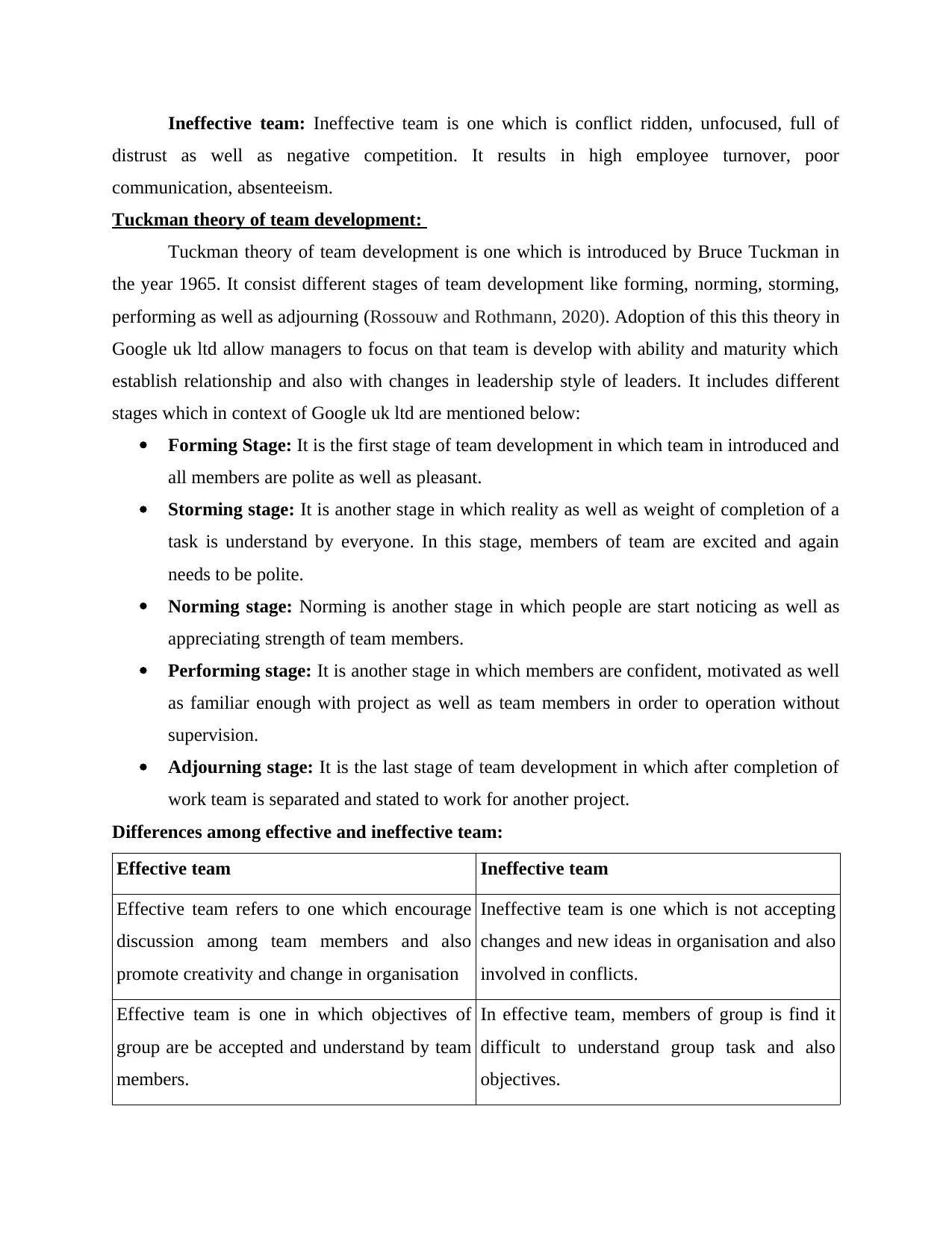
Ineffective team: Ineffective team is one which is conflict ridden, unfocused, full of
distrust as well as negative competition. It results in high employee turnover, poor
communication, absenteeism.
Tuckman theory of team development:
Tuckman theory of team development is one which is introduced by Bruce Tuckman in
the year 1965. It consist different stages of team development like forming, norming, storming,
performing as well as adjourning (Rossouw and Rothmann, 2020). Adoption of this this theory in
Google uk ltd allow managers to focus on that team is develop with ability and maturity which
establish relationship and also with changes in leadership style of leaders. It includes different
stages which in context of Google uk ltd are mentioned below:
Forming Stage: It is the first stage of team development in which team in introduced and
all members are polite as well as pleasant.
Storming stage: It is another stage in which reality as well as weight of completion of a
task is understand by everyone. In this stage, members of team are excited and again
needs to be polite.
Norming stage: Norming is another stage in which people are start noticing as well as
appreciating strength of team members.
Performing stage: It is another stage in which members are confident, motivated as well
as familiar enough with project as well as team members in order to operation without
supervision.
Adjourning stage: It is the last stage of team development in which after completion of
work team is separated and stated to work for another project.
Differences among effective and ineffective team:
Effective team Ineffective team
Effective team refers to one which encourage
discussion among team members and also
promote creativity and change in organisation
Ineffective team is one which is not accepting
changes and new ideas in organisation and also
involved in conflicts.
Effective team is one in which objectives of
group are be accepted and understand by team
members.
In effective team, members of group is find it
difficult to understand group task and also
objectives.
distrust as well as negative competition. It results in high employee turnover, poor
communication, absenteeism.
Tuckman theory of team development:
Tuckman theory of team development is one which is introduced by Bruce Tuckman in
the year 1965. It consist different stages of team development like forming, norming, storming,
performing as well as adjourning (Rossouw and Rothmann, 2020). Adoption of this this theory in
Google uk ltd allow managers to focus on that team is develop with ability and maturity which
establish relationship and also with changes in leadership style of leaders. It includes different
stages which in context of Google uk ltd are mentioned below:
Forming Stage: It is the first stage of team development in which team in introduced and
all members are polite as well as pleasant.
Storming stage: It is another stage in which reality as well as weight of completion of a
task is understand by everyone. In this stage, members of team are excited and again
needs to be polite.
Norming stage: Norming is another stage in which people are start noticing as well as
appreciating strength of team members.
Performing stage: It is another stage in which members are confident, motivated as well
as familiar enough with project as well as team members in order to operation without
supervision.
Adjourning stage: It is the last stage of team development in which after completion of
work team is separated and stated to work for another project.
Differences among effective and ineffective team:
Effective team Ineffective team
Effective team refers to one which encourage
discussion among team members and also
promote creativity and change in organisation
Ineffective team is one which is not accepting
changes and new ideas in organisation and also
involved in conflicts.
Effective team is one in which objectives of
group are be accepted and understand by team
members.
In effective team, members of group is find it
difficult to understand group task and also
objectives.
Paraphrase This Document
Need a fresh take? Get an instant paraphrase of this document with our AI Paraphraser
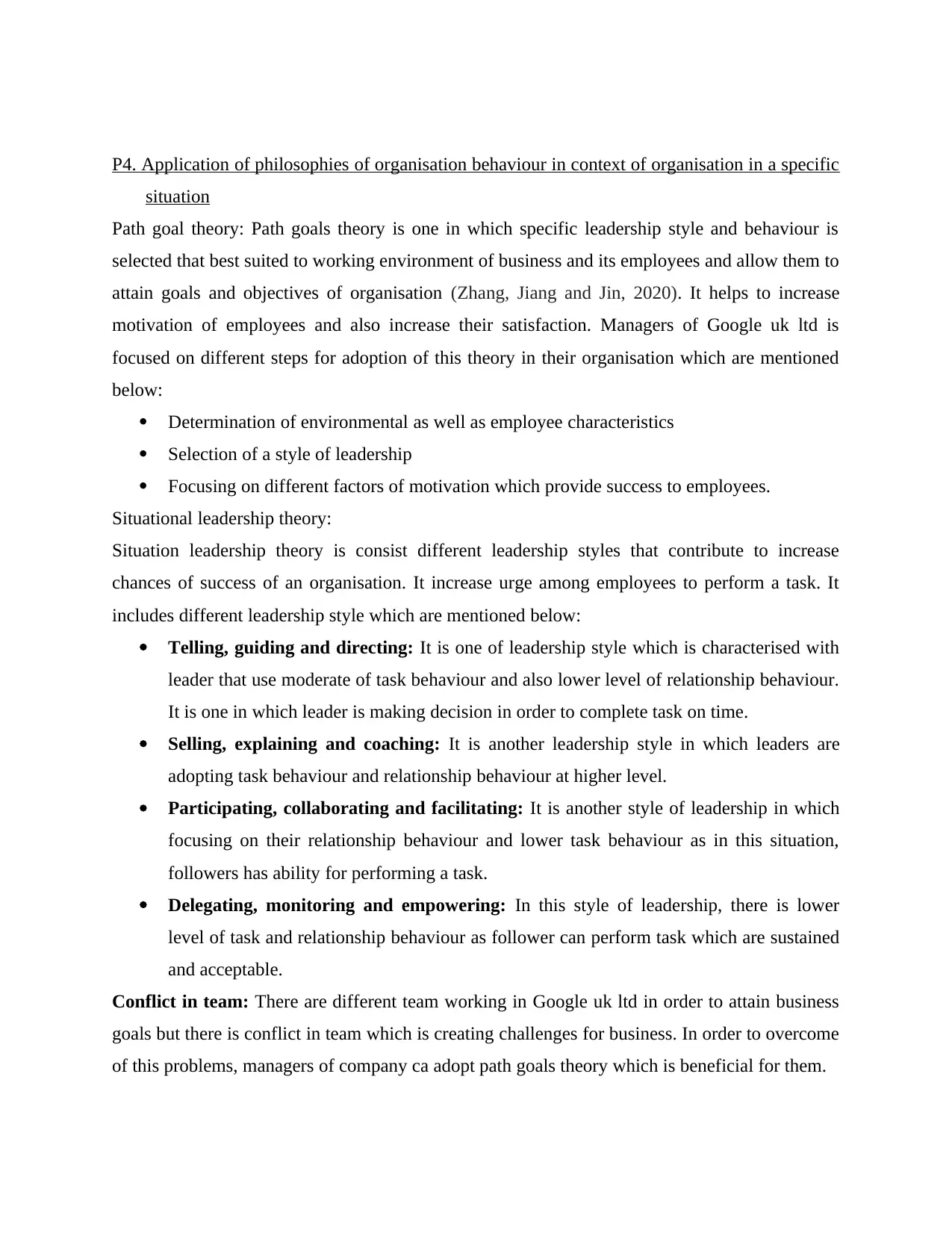
P4. Application of philosophies of organisation behaviour in context of organisation in a specific
situation
Path goal theory: Path goals theory is one in which specific leadership style and behaviour is
selected that best suited to working environment of business and its employees and allow them to
attain goals and objectives of organisation (Zhang, Jiang and Jin, 2020). It helps to increase
motivation of employees and also increase their satisfaction. Managers of Google uk ltd is
focused on different steps for adoption of this theory in their organisation which are mentioned
below:
Determination of environmental as well as employee characteristics
Selection of a style of leadership
Focusing on different factors of motivation which provide success to employees.
Situational leadership theory:
Situation leadership theory is consist different leadership styles that contribute to increase
chances of success of an organisation. It increase urge among employees to perform a task. It
includes different leadership style which are mentioned below:
Telling, guiding and directing: It is one of leadership style which is characterised with
leader that use moderate of task behaviour and also lower level of relationship behaviour.
It is one in which leader is making decision in order to complete task on time.
Selling, explaining and coaching: It is another leadership style in which leaders are
adopting task behaviour and relationship behaviour at higher level.
Participating, collaborating and facilitating: It is another style of leadership in which
focusing on their relationship behaviour and lower task behaviour as in this situation,
followers has ability for performing a task.
Delegating, monitoring and empowering: In this style of leadership, there is lower
level of task and relationship behaviour as follower can perform task which are sustained
and acceptable.
Conflict in team: There are different team working in Google uk ltd in order to attain business
goals but there is conflict in team which is creating challenges for business. In order to overcome
of this problems, managers of company ca adopt path goals theory which is beneficial for them.
situation
Path goal theory: Path goals theory is one in which specific leadership style and behaviour is
selected that best suited to working environment of business and its employees and allow them to
attain goals and objectives of organisation (Zhang, Jiang and Jin, 2020). It helps to increase
motivation of employees and also increase their satisfaction. Managers of Google uk ltd is
focused on different steps for adoption of this theory in their organisation which are mentioned
below:
Determination of environmental as well as employee characteristics
Selection of a style of leadership
Focusing on different factors of motivation which provide success to employees.
Situational leadership theory:
Situation leadership theory is consist different leadership styles that contribute to increase
chances of success of an organisation. It increase urge among employees to perform a task. It
includes different leadership style which are mentioned below:
Telling, guiding and directing: It is one of leadership style which is characterised with
leader that use moderate of task behaviour and also lower level of relationship behaviour.
It is one in which leader is making decision in order to complete task on time.
Selling, explaining and coaching: It is another leadership style in which leaders are
adopting task behaviour and relationship behaviour at higher level.
Participating, collaborating and facilitating: It is another style of leadership in which
focusing on their relationship behaviour and lower task behaviour as in this situation,
followers has ability for performing a task.
Delegating, monitoring and empowering: In this style of leadership, there is lower
level of task and relationship behaviour as follower can perform task which are sustained
and acceptable.
Conflict in team: There are different team working in Google uk ltd in order to attain business
goals but there is conflict in team which is creating challenges for business. In order to overcome
of this problems, managers of company ca adopt path goals theory which is beneficial for them.
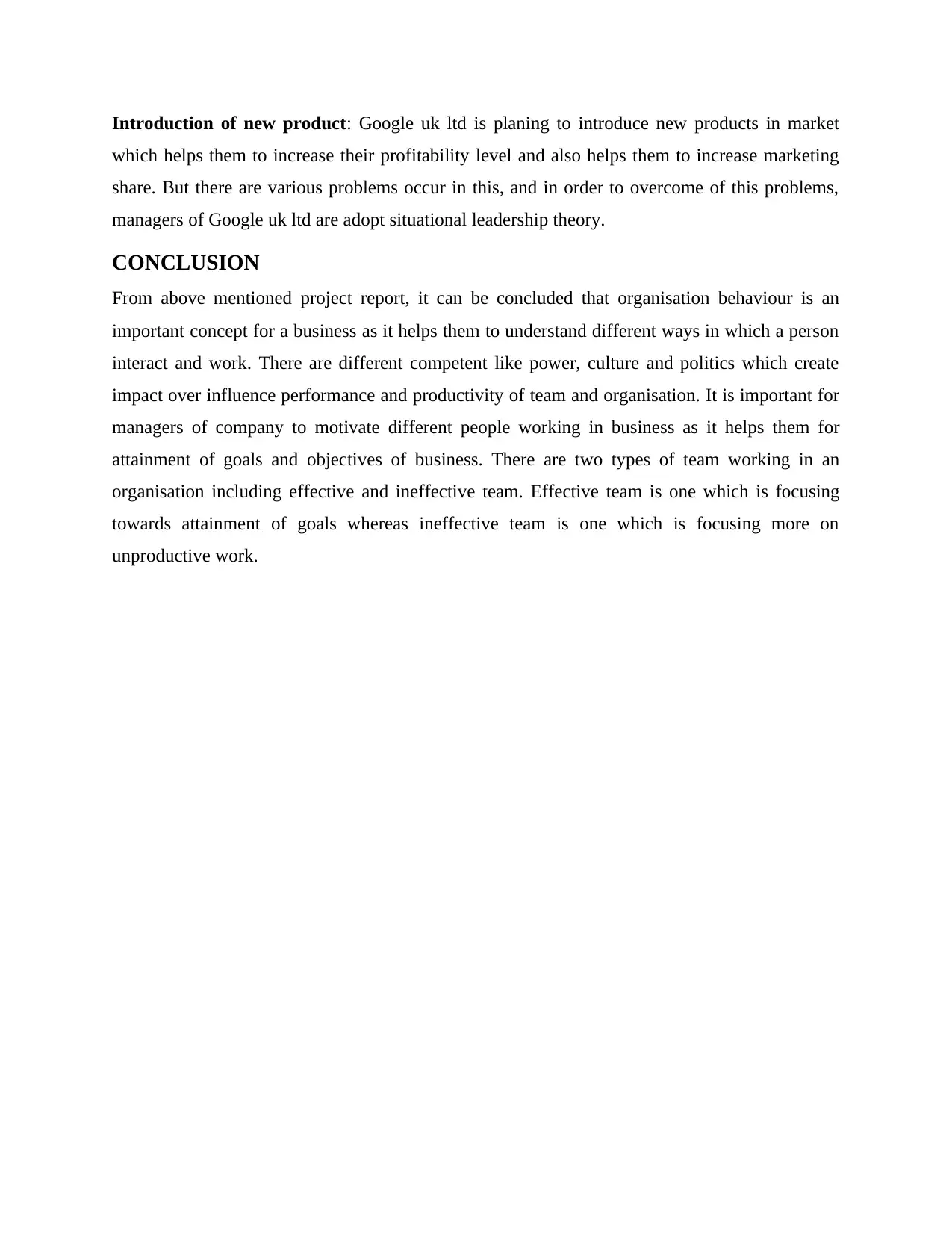
Introduction of new product: Google uk ltd is planing to introduce new products in market
which helps them to increase their profitability level and also helps them to increase marketing
share. But there are various problems occur in this, and in order to overcome of this problems,
managers of Google uk ltd are adopt situational leadership theory.
CONCLUSION
From above mentioned project report, it can be concluded that organisation behaviour is an
important concept for a business as it helps them to understand different ways in which a person
interact and work. There are different competent like power, culture and politics which create
impact over influence performance and productivity of team and organisation. It is important for
managers of company to motivate different people working in business as it helps them for
attainment of goals and objectives of business. There are two types of team working in an
organisation including effective and ineffective team. Effective team is one which is focusing
towards attainment of goals whereas ineffective team is one which is focusing more on
unproductive work.
which helps them to increase their profitability level and also helps them to increase marketing
share. But there are various problems occur in this, and in order to overcome of this problems,
managers of Google uk ltd are adopt situational leadership theory.
CONCLUSION
From above mentioned project report, it can be concluded that organisation behaviour is an
important concept for a business as it helps them to understand different ways in which a person
interact and work. There are different competent like power, culture and politics which create
impact over influence performance and productivity of team and organisation. It is important for
managers of company to motivate different people working in business as it helps them for
attainment of goals and objectives of business. There are two types of team working in an
organisation including effective and ineffective team. Effective team is one which is focusing
towards attainment of goals whereas ineffective team is one which is focusing more on
unproductive work.
⊘ This is a preview!⊘
Do you want full access?
Subscribe today to unlock all pages.

Trusted by 1+ million students worldwide
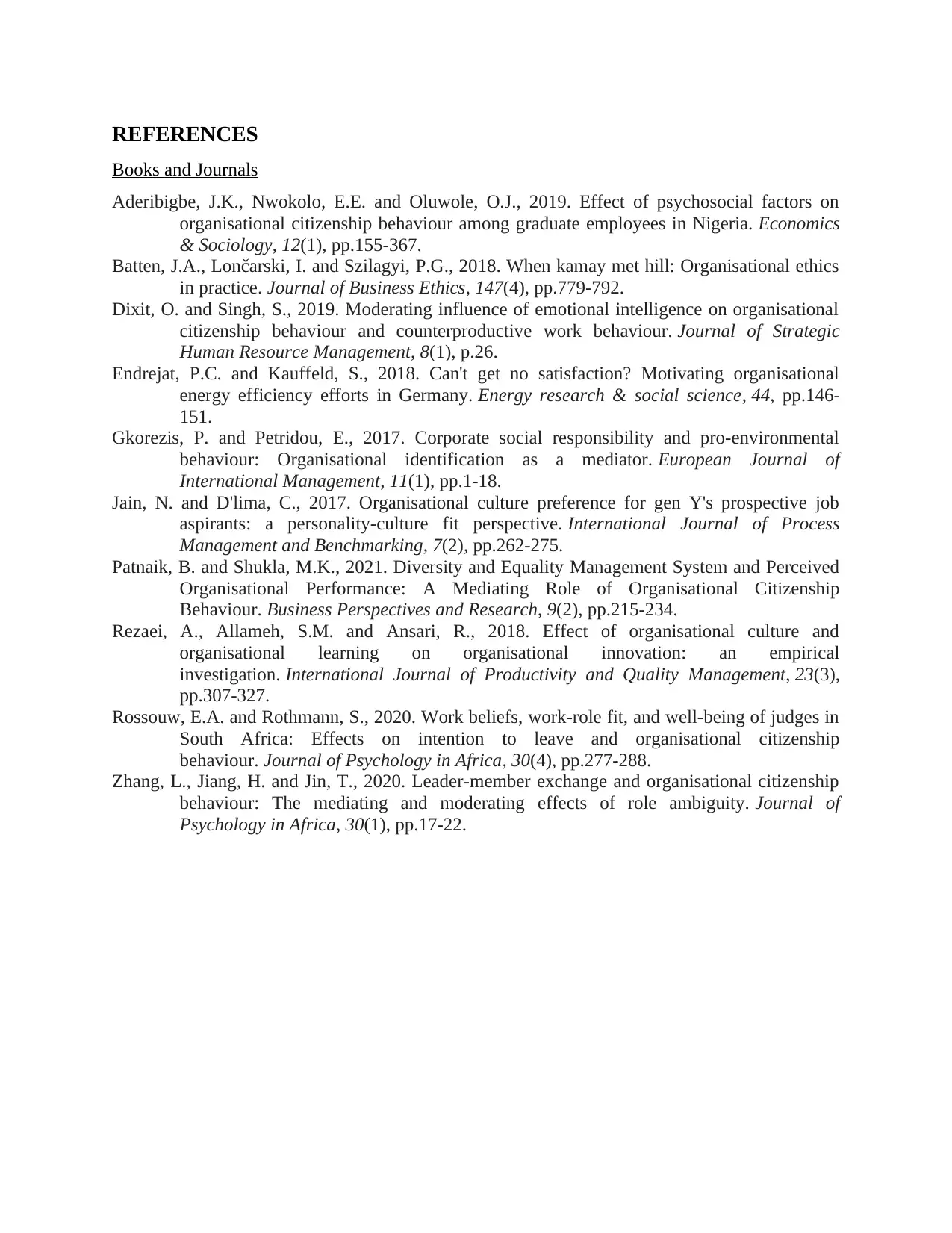
REFERENCES
Books and Journals
Aderibigbe, J.K., Nwokolo, E.E. and Oluwole, O.J., 2019. Effect of psychosocial factors on
organisational citizenship behaviour among graduate employees in Nigeria. Economics
& Sociology, 12(1), pp.155-367.
Batten, J.A., Lončarski, I. and Szilagyi, P.G., 2018. When kamay met hill: Organisational ethics
in practice. Journal of Business Ethics, 147(4), pp.779-792.
Dixit, O. and Singh, S., 2019. Moderating influence of emotional intelligence on organisational
citizenship behaviour and counterproductive work behaviour. Journal of Strategic
Human Resource Management, 8(1), p.26.
Endrejat, P.C. and Kauffeld, S., 2018. Can't get no satisfaction? Motivating organisational
energy efficiency efforts in Germany. Energy research & social science, 44, pp.146-
151.
Gkorezis, P. and Petridou, E., 2017. Corporate social responsibility and pro-environmental
behaviour: Organisational identification as a mediator. European Journal of
International Management, 11(1), pp.1-18.
Jain, N. and D'lima, C., 2017. Organisational culture preference for gen Y's prospective job
aspirants: a personality-culture fit perspective. International Journal of Process
Management and Benchmarking, 7(2), pp.262-275.
Patnaik, B. and Shukla, M.K., 2021. Diversity and Equality Management System and Perceived
Organisational Performance: A Mediating Role of Organisational Citizenship
Behaviour. Business Perspectives and Research, 9(2), pp.215-234.
Rezaei, A., Allameh, S.M. and Ansari, R., 2018. Effect of organisational culture and
organisational learning on organisational innovation: an empirical
investigation. International Journal of Productivity and Quality Management, 23(3),
pp.307-327.
Rossouw, E.A. and Rothmann, S., 2020. Work beliefs, work-role fit, and well-being of judges in
South Africa: Effects on intention to leave and organisational citizenship
behaviour. Journal of Psychology in Africa, 30(4), pp.277-288.
Zhang, L., Jiang, H. and Jin, T., 2020. Leader-member exchange and organisational citizenship
behaviour: The mediating and moderating effects of role ambiguity. Journal of
Psychology in Africa, 30(1), pp.17-22.
Books and Journals
Aderibigbe, J.K., Nwokolo, E.E. and Oluwole, O.J., 2019. Effect of psychosocial factors on
organisational citizenship behaviour among graduate employees in Nigeria. Economics
& Sociology, 12(1), pp.155-367.
Batten, J.A., Lončarski, I. and Szilagyi, P.G., 2018. When kamay met hill: Organisational ethics
in practice. Journal of Business Ethics, 147(4), pp.779-792.
Dixit, O. and Singh, S., 2019. Moderating influence of emotional intelligence on organisational
citizenship behaviour and counterproductive work behaviour. Journal of Strategic
Human Resource Management, 8(1), p.26.
Endrejat, P.C. and Kauffeld, S., 2018. Can't get no satisfaction? Motivating organisational
energy efficiency efforts in Germany. Energy research & social science, 44, pp.146-
151.
Gkorezis, P. and Petridou, E., 2017. Corporate social responsibility and pro-environmental
behaviour: Organisational identification as a mediator. European Journal of
International Management, 11(1), pp.1-18.
Jain, N. and D'lima, C., 2017. Organisational culture preference for gen Y's prospective job
aspirants: a personality-culture fit perspective. International Journal of Process
Management and Benchmarking, 7(2), pp.262-275.
Patnaik, B. and Shukla, M.K., 2021. Diversity and Equality Management System and Perceived
Organisational Performance: A Mediating Role of Organisational Citizenship
Behaviour. Business Perspectives and Research, 9(2), pp.215-234.
Rezaei, A., Allameh, S.M. and Ansari, R., 2018. Effect of organisational culture and
organisational learning on organisational innovation: an empirical
investigation. International Journal of Productivity and Quality Management, 23(3),
pp.307-327.
Rossouw, E.A. and Rothmann, S., 2020. Work beliefs, work-role fit, and well-being of judges in
South Africa: Effects on intention to leave and organisational citizenship
behaviour. Journal of Psychology in Africa, 30(4), pp.277-288.
Zhang, L., Jiang, H. and Jin, T., 2020. Leader-member exchange and organisational citizenship
behaviour: The mediating and moderating effects of role ambiguity. Journal of
Psychology in Africa, 30(1), pp.17-22.
Paraphrase This Document
Need a fresh take? Get an instant paraphrase of this document with our AI Paraphraser


⊘ This is a preview!⊘
Do you want full access?
Subscribe today to unlock all pages.

Trusted by 1+ million students worldwide
1 out of 12
Related Documents
Your All-in-One AI-Powered Toolkit for Academic Success.
+13062052269
info@desklib.com
Available 24*7 on WhatsApp / Email
![[object Object]](/_next/static/media/star-bottom.7253800d.svg)
Unlock your academic potential
Copyright © 2020–2026 A2Z Services. All Rights Reserved. Developed and managed by ZUCOL.



